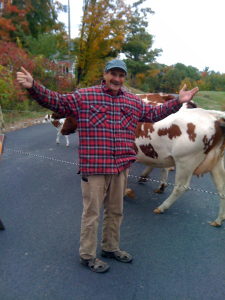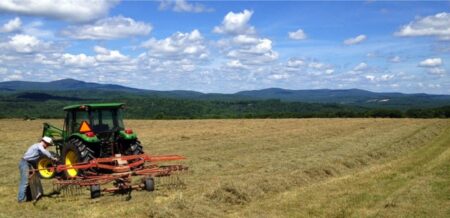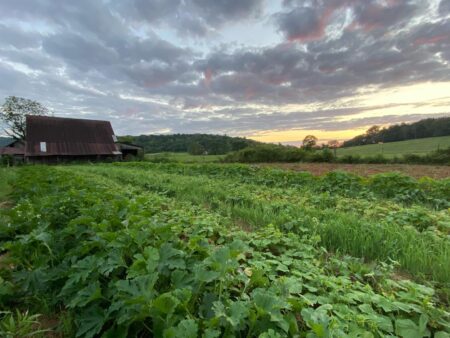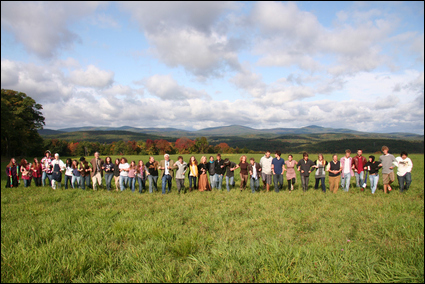Regenerative finance helps Living Lands Trust expand biodynamic farming
Mar 18 2024
A $300,000 mortgage loan from RSF Social Finance supported the organization’s pioneering model for transferring carefully cultivated land and knowledge to a new generation of farmers
In 2013, Living Lands Trust found itself in a bind: 76 acres of biodynamic farmland in Wisconsin adjacent to fields it had already protected for regenerative agriculture were going on the market. Losing this land could sink the dairy operation of the young farmers the trust was working with, but neither the farmers nor the trust had the money to purchase and protect these fields.
Living Lands Trust approached RSF Social Finance, an obvious choice because RSF understood that regenerative agriculture requires regenerative finance—a funding approach designed to create shared value, solve systemic problems, and regenerate communities and natural environments.
RSF also fully grasped what was at stake: The purchase would permanently protect an important piece of an already successful farm cultivated by farmers who were well known for their deep knowledge and commitment to land stewardship, sustaining this vibrant farm for the benefit of the community and local economy. With a $300,000 mortgage loan, RSF enabled Living Lands Trust to seize the opportunity, and a long-term partnership was born.

Lincoln Geiger, one of three founding farmers of the Temple Wilton Community Farm in Wilton, New Hampshire, manages cow crossing. Credit: Ian McSweeney
Preserving biodynamic farmland for the next generation
Living Lands Trust, established in 2000 as Yggdrasil (ig-dra-sil) Land Foundation, today holds more than 2,400 acres in southeastern Wisconsin, Northern California, southern New Hampshire, and north-central Texas. While most land stewardship organizations focus on preserving land, Living Lands Trust aims to keep the land viable for regenerative and biodynamic cultivation practices that produce social, ecological, and local economic value.
Living Lands Trust works with landowners who want to permanently protect their property for use by future generations of farmers and other ecological entrepreneurs, encouraging them to explore ownership and stewardship models that promote ecological integrity along with shared rights and responsibilities. Through this relationship building, Living Lands Trust receives gifts of land and buildings as well as financial donations to secure land.
Living Lands Trust and kindred organizations like The Farmers Land Trust also challenge the idea that you need to own land to benefit from it. Through Living Lands Trust’s work, land is leased to or held cooperatively by farmers, ranchers, and ecological entrepreneurs who are committed to biodynamic farming and other regenerative land stewardship practices. Legal agreements are structured to allow farmers of all experience levels to cultivate land long term without taking on an enormous financial burden. Local land trusts hold easements to provide added assurance that these places are perpetually protected for the common good.
“The approaches our organizations are developing are designed to create shared community rights, responsibilities, and authorities, which in many ways run counter to the deeply held views and understandings of private property,” says David Outman, executive director of Living Lands Trust. He adds that partnerships between organizations provide the glue that makes challenging these norms and others possible.
“Land work requires collaboration because of the legal and cultural complexity of land use as well as its high cost and value. Partnerships like the one we have with The Farmers Land Trust are essential for scaling in the midst of an incredible period of farmland ownership change, especially given that land access is one of the greatest challenges for young and new farmers. Much of our organizations’ work is separate, but the big-picture progress and change we envision is going to require many more people, partnerships, and collaborations of all kinds.”

Frye Field’s last hay harvest before High Mowing School acquired the title and Living Lands Trust acquired the conservation easement. Credit: Ian McSweeney
Removing barriers to the spread of biodynamic farming
Biodynamic farming goes beyond organic because it emphasizes the health and interconnectedness of the whole farm: Naturally pollinated plants, locally sourced materials, and heritage animals intermingle and nourish one another. Though popular in countries including Germany and Australia, the method has been slow to spread in the U.S.
“The three biggest hurdles to implementation and success in the U.S. are land access, knowledge transfer, and access to all types of capital, including funding, resources, and support,” says Ian McSweeney, co–executive director of The Farmers Land Trust.
Land access is particularly challenging for younger and mid-career farmers, notes Kristina Villa, a biodynamic farmer and co–executive director of The Farmers Land Trust. “Prices are extremely out of touch with reality: They’re so incredibly high that no farmer can afford them.”
Meanwhile, older biodynamic farmers are aging out. They don’t want to sell to an investment company, knowing that their life’s work—creating a regenerative environment that can support a healthy food system—will be erased and their knowledge lost. But they need funding for business succession planning, retirement, and healthcare.
Nonprofits like Living Lands Trust and The Farmers Land Trust provide powerful solutions to these problems through four main avenues: land transition and protection, support and advising in land matters, land access and stewardship, and land trust partnerships.
Impact: building a model for biodynamic farming and land stewardship
RSF’s loan, which Living Lands Trust repaid in 2024, didn’t just fund the land purchase—it also supported development of an innovative model for farmland stewardship, Outman says. “RSF is our sister organization in a way. We are thoroughly mission aligned, and the team fully grasps the challenges we are addressing. They are also operating outside of the way conventional financial institutions work, providing small and innovative organizations access to capital where we would otherwise be excluded.”
Living Lands Trust sees a huge opportunity for institutional investment capital to bridge the gap between generations, allowing exiting farmers to pay off debt and creating more patient, flexible repayment structures for new and younger farmers while preserving generational knowledge. The ultimate vision is to create conditions for vibrant human communities that are nourished, physically and spiritually, by the land. Freeing the land from speculative ownership and spiraling real estate markets will ensure equitable access to healthy places for all, and the livelihoods derived from regenerative stewardship and associated enterprises are the foundation of thriving regional economies.
“If you’re not taking steps to protect investments that are being made in regenerative agriculture now, you lose them quickly,” Outman says. “Even if the land is not converted for other use, even if it’s restored to typical agriculture, it takes a tremendous amount of time and energy to reestablish the biological health in soil to make it self-regenerating. So collectively, I would love for people to recognize that the true promise of this work is beyond a lifetime.”

